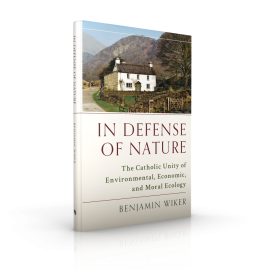By Benjamin Wiker
Benjamin Wiker is a professor of Political Science and Director of Human Life Studies at Franciscan University of Steubenville. He is the author of In Defense of Nature: The Catholic Unity of Environmental, Economic, and Moral Ecology.

A great part of our problem today—for both the Left and the Right—is that we are in a strange condition of being abstracted from nature (including human nature itself) by science and technology. Generally speaking, the Left is abstracted from human nature, and the Right is abstracted from nature. As a result, we have created a culture that keeps us from discovering nature, a culture that deforms human nature from its very earliest stages.
To begin with the obvious, kids today do not play outside and explore nature, but spend almost all their waking hours in day care and school, and playing on computers and smartphones the rest of the time. As a consequence, our kids are hyper-obese and they know next to nothing about the natural world. They don’t know nature because they were born into a screen culture, which quite literally dominates their landscape. As a result, they live in a virtual, not a natural, world, an artificially created culture that, we must add, is manipulated by the people behind the screens for their great economic profit. This kind of abstraction is not limited to our youth, but has become a national habit. Our removal from nature is, largely, a tendency of the Right, and this tendency is amplified by our cultural screen addiction. (To awaken Christians from their slumber in this regard, in staring at our screens we are oblivious to creation, the great and glorious gift of God, and hence to our natural place in that created order.)
But there are less obvious ways in which we have removed ourselves from nature. Ironically, science itself has become abstracted from nature, turning away from the study of actual living, breathing, complex things in their environment (a science which used to be called natural history), to the obsessive, reductionist study of the chemical foundations of life, a study done entirely inside, and more and more, on computer screens, thereby compounding the kind of cultural abstraction from nature noted in the previous paragraph. You can’t love and care for what you don’t know, and our scientists are increasingly alienated from nature itself, from living populations in actual communities in real ecosystems. They’ve become lab animals themselves, rather than natural historians immersed in the wild. This tendency of science afflicts both the Left and Right.
Even stranger, we have become abstracted from our own natures, including our own moral natures (again, the dominant tendency of the Left). We no longer know what we are, and hence what we should be, and this problem is connected with the other two just mentioned. We have become detached from nature and human nature by our screen culture, and embraced a reductionist view of human nature in science as well, one largely defined by the Baconian notion that our goal in this life is the individual maximization of our bodily pleasure, comfort, and convenience, a goal which demands the mastering of nature (including human nature) by technology for its completion.
For all three reasons, we live in an artificial cultural world, one created by human beings in which nature, seemingly, plays no part (hence, the bite of the parody in the film Wall·E). As a consequence of this ignorance, people simply don’t care about nature. They don’t care about the environment. They don’t care about the wonders of creation. They don’t even care about their own bodies. They don’t care about much of anything but the screen. Again, you can’t care about, and care for, what you don’t even know. The screen eclipses nature.
What does that mean? What can cure it?
The recovery of natural wonder. I still recall the first night that I saw the moon. I was, I believe, about 37 or 38 years old. Of course, I knew it was up there all along, although I didn’t know much about it. I’d catch a glimpse of it if I happened to be outside at night for a few minutes, but most of my evening time would have been spent staring vacantly at another light, the cyclopean rectangular eye glowing in the living room. The moon was, for me, really like things on the screen: a two-dimensional round object on the blackish backdrop screen of the night sky.
But a strange thing happened one night when I went outside with some binoculars, again, sadly, almost four decades into my life. When I trained them skywards—something I’d never done before—I was overwhelmed, quite literally stunned, because for the first time (with the aid of the binoculars) I saw the moon as a large, round, real, beautiful, luminous object floating way up in the sky. I had discovered, late in life, that’s what the moon is. I stared and stared for I don’t know how long.
In this singular experience, I was entirely caught up in what the great ancient philosopher Aristotle called “wonder,” the feeling of awe at nature—not a mere sensation, but an overpowering full-body, full-mind, sensuous, and intellectual experience. How can such a thing be, and yet it is! And wonder, as Aristotle goes on to say, is the beginning of philosophy—not an academic discipline in which people are tenured regardless of the merits of their ideas, but according to the etymology of the Greek, the love of wisdom, philo-sophia, the natural desire to know the wonder-full things in the wise order of nature.
That exhilaration is the primal human experience of our natural world, the one that answers to the deepest and definitive aspects of our rational nature. We are the creatures that can wonder, and inquire into, the wonder-full order of nature. That’s what we should be doing if we want to experience fully what we really are. That “should,” rooted in our deepest nature, has a moral aspect to it, an intrinsic demand for fulfillment that defines the highest aspects of the natural law.
You Might Also Like

Ecology calls to mind nature “out there”—trees, rivers, oceans, animals, birds, the air, distinct ecosystems. But as Benjamin Wiker argues in his book In Defense of Nature, an obvious part of nature has been mysteriously left out of the environmental movement: our own nature—human nature, especially its essential moral aspects.

